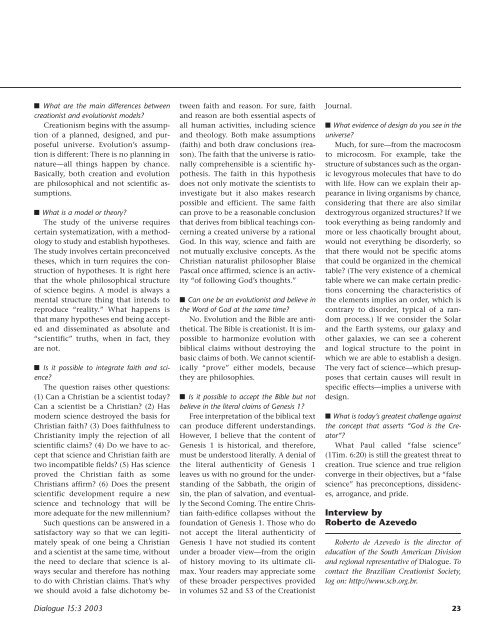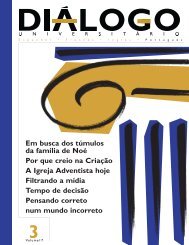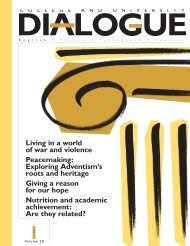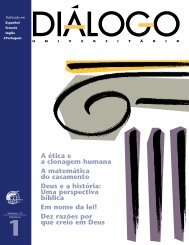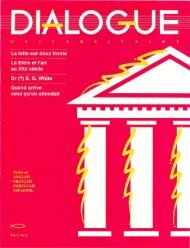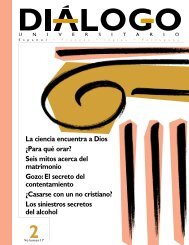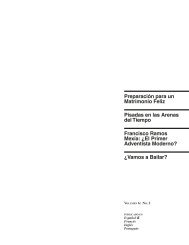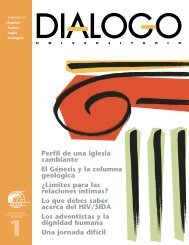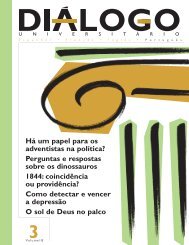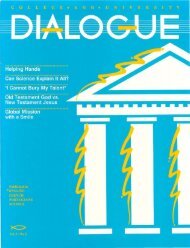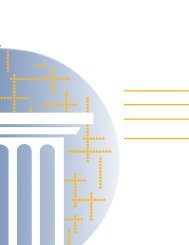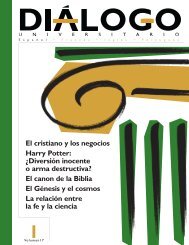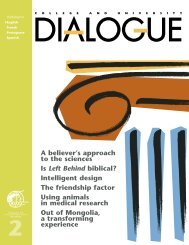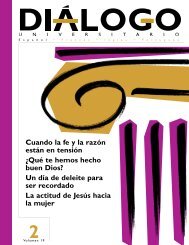Faith, reason, and the educated Christian Creationism - College and ...
Faith, reason, and the educated Christian Creationism - College and ...
Faith, reason, and the educated Christian Creationism - College and ...
You also want an ePaper? Increase the reach of your titles
YUMPU automatically turns print PDFs into web optimized ePapers that Google loves.
■ What are <strong>the</strong> main differences between<br />
creationist <strong>and</strong> evolutionist models?<br />
<strong>Creationism</strong> begins with <strong>the</strong> assumption<br />
of a planned, designed, <strong>and</strong> purposeful<br />
universe. Evolution’s assumption<br />
is different: There is no planning in<br />
nature—all things happen by chance.<br />
Basically, both creation <strong>and</strong> evolution<br />
are philosophical <strong>and</strong> not scientific assumptions.<br />
■ What is a model or <strong>the</strong>ory?<br />
The study of <strong>the</strong> universe requires<br />
certain systematization, with a methodology<br />
to study <strong>and</strong> establish hypo<strong>the</strong>ses.<br />
The study involves certain preconceived<br />
<strong>the</strong>ses, which in turn requires <strong>the</strong> construction<br />
of hypo<strong>the</strong>ses. It is right here<br />
that <strong>the</strong> whole philosophical structure<br />
of science begins. A model is always a<br />
mental structure thing that intends to<br />
reproduce “reality.” What happens is<br />
that many hypo<strong>the</strong>ses end being accepted<br />
<strong>and</strong> disseminated as absolute <strong>and</strong><br />
“scientific” truths, when in fact, <strong>the</strong>y<br />
are not.<br />
Dialogue 15:3 2003<br />
■ Is it possible to integrate faith <strong>and</strong> science?<br />
The question raises o<strong>the</strong>r questions:<br />
(1) Can a <strong>Christian</strong> be a scientist today?<br />
Can a scientist be a <strong>Christian</strong>? (2) Has<br />
modern science destroyed <strong>the</strong> basis for<br />
<strong>Christian</strong> faith? (3) Does faithfulness to<br />
<strong>Christian</strong>ity imply <strong>the</strong> rejection of all<br />
scientific claims? (4) Do we have to accept<br />
that science <strong>and</strong> <strong>Christian</strong> faith are<br />
two incompatible fields? (5) Has science<br />
proved <strong>the</strong> <strong>Christian</strong> faith as some<br />
<strong>Christian</strong>s affirm? (6) Does <strong>the</strong> present<br />
scientific development require a new<br />
science <strong>and</strong> technology that will be<br />
more adequate for <strong>the</strong> new millennium?<br />
Such questions can be answered in a<br />
satisfactory way so that we can legitimately<br />
speak of one being a <strong>Christian</strong><br />
<strong>and</strong> a scientist at <strong>the</strong> same time, without<br />
<strong>the</strong> need to declare that science is always<br />
secular <strong>and</strong> <strong>the</strong>refore has nothing<br />
to do with <strong>Christian</strong> claims. That’s why<br />
we should avoid a false dichotomy between<br />
faith <strong>and</strong> <strong>reason</strong>. For sure, faith<br />
<strong>and</strong> <strong>reason</strong> are both essential aspects of<br />
all human activities, including science<br />
<strong>and</strong> <strong>the</strong>ology. Both make assumptions<br />
(faith) <strong>and</strong> both draw conclusions (<strong>reason</strong>).<br />
The faith that <strong>the</strong> universe is rationally<br />
comprehensible is a scientific hypo<strong>the</strong>sis.<br />
The faith in this hypo<strong>the</strong>sis<br />
does not only motivate <strong>the</strong> scientists to<br />
investigate but it also makes research<br />
possible <strong>and</strong> efficient. The same faith<br />
can prove to be a <strong>reason</strong>able conclusion<br />
that derives from biblical teachings concerning<br />
a created universe by a rational<br />
God. In this way, science <strong>and</strong> faith are<br />
not mutually exclusive concepts. As <strong>the</strong><br />
<strong>Christian</strong> naturalist philosopher Blaise<br />
Pascal once affirmed, science is an activity<br />
“of following God’s thoughts.”<br />
■ Can one be an evolutionist <strong>and</strong> believe in<br />
<strong>the</strong> Word of God at <strong>the</strong> same time?<br />
No. Evolution <strong>and</strong> <strong>the</strong> Bible are anti<strong>the</strong>tical.<br />
The Bible is creationist. It is impossible<br />
to harmonize evolution with<br />
biblical claims without destroying <strong>the</strong><br />
basic claims of both. We cannot scientifically<br />
“prove” ei<strong>the</strong>r models, because<br />
<strong>the</strong>y are philosophies.<br />
■ Is it possible to accept <strong>the</strong> Bible but not<br />
believe in <strong>the</strong> literal claims of Genesis 1?<br />
Free interpretation of <strong>the</strong> biblical text<br />
can produce different underst<strong>and</strong>ings.<br />
However, I believe that <strong>the</strong> content of<br />
Genesis 1 is historical, <strong>and</strong> <strong>the</strong>refore,<br />
must be understood literally. A denial of<br />
<strong>the</strong> literal au<strong>the</strong>nticity of Genesis 1<br />
leaves us with no ground for <strong>the</strong> underst<strong>and</strong>ing<br />
of <strong>the</strong> Sabbath, <strong>the</strong> origin of<br />
sin, <strong>the</strong> plan of salvation, <strong>and</strong> eventually<br />
<strong>the</strong> Second Coming. The entire <strong>Christian</strong><br />
faith-edifice collapses without <strong>the</strong><br />
foundation of Genesis 1. Those who do<br />
not accept <strong>the</strong> literal au<strong>the</strong>nticity of<br />
Genesis 1 have not studied its content<br />
under a broader view—from <strong>the</strong> origin<br />
of history moving to its ultimate climax.<br />
Your readers may appreciate some<br />
of <strong>the</strong>se broader perspectives provided<br />
in volumes 52 <strong>and</strong> 53 of <strong>the</strong> Creationist<br />
Journal.<br />
■ What evidence of design do you see in <strong>the</strong><br />
universe?<br />
Much, for sure—from <strong>the</strong> macrocosm<br />
to microcosm. For example, take <strong>the</strong><br />
structure of substances such as <strong>the</strong> organic<br />
levogyrous molecules that have to do<br />
with life. How can we explain <strong>the</strong>ir appearance<br />
in living organisms by chance,<br />
considering that <strong>the</strong>re are also similar<br />
dextrogyrous organized structures? If we<br />
took everything as being r<strong>and</strong>omly <strong>and</strong><br />
more or less chaotically brought about,<br />
would not everything be disorderly, so<br />
that <strong>the</strong>re would not be specific atoms<br />
that could be organized in <strong>the</strong> chemical<br />
table? (The very existence of a chemical<br />
table where we can make certain predictions<br />
concerning <strong>the</strong> characteristics of<br />
<strong>the</strong> elements implies an order, which is<br />
contrary to disorder, typical of a r<strong>and</strong>om<br />
process.) If we consider <strong>the</strong> Solar<br />
<strong>and</strong> <strong>the</strong> Earth systems, our galaxy <strong>and</strong><br />
o<strong>the</strong>r galaxies, we can see a coherent<br />
<strong>and</strong> logical structure to <strong>the</strong> point in<br />
which we are able to establish a design.<br />
The very fact of science—which presupposes<br />
that certain causes will result in<br />
specific effects—implies a universe with<br />
design.<br />
■ What is today’s greatest challenge against<br />
<strong>the</strong> concept that asserts “God is <strong>the</strong> Creator”?<br />
What Paul called “false science”<br />
(1Tim. 6:20) is still <strong>the</strong> greatest threat to<br />
creation. True science <strong>and</strong> true religion<br />
converge in <strong>the</strong>ir objectives, but a “false<br />
science” has preconceptions, dissidences,<br />
arrogance, <strong>and</strong> pride.<br />
Interview by<br />
Roberto de Azevedo<br />
Roberto de Azevedo is <strong>the</strong> director of<br />
education of <strong>the</strong> South American Division<br />
<strong>and</strong> regional representative of Dialogue. To<br />
contact <strong>the</strong> Brazilian Creationist Society,<br />
log on: http://www.scb.org.br.<br />
23


